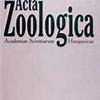Agri-environment schemes do not support Brown Hare populations due to inadequate scheme application
IF 0.8
4区 生物学
Q4 ZOOLOGY
Acta Zoologica Academiae Scientiarum Hungaricae
Pub Date : 2021-01-01
DOI:10.17109/azh.67.3.263.2021
引用次数: 2
Abstract
The goal of many agri-environment schemes (AES) is to increase biodiversity in agroecosystems. AES effects are often measured on invertebrates and birds; mammals as indicator species are infrequently targets of such researches. Our goal was to evaluate the local-scale effects of the Hungarian Agri-Environmental Measures (AEM) on the European brown hare (Lepus europaeus), which shows decreasing population trends across Europe. We compared hare abundances and their dropping numbers in AEM and control agricultural arable and grassland fields of 17 game management units in two seasons. We also examined the quality of arable fields based on their margin width and vegetation cover. We found that margin quality was higher in AEM than in the control fields. Control grasslands had higher vegetation quality than the AEM grasslands. We found a significant difference in hare counts between AEM and control arable fields in spring but no difference in autumn. The dropping densities did not differ in any season, treatment category or agroecosystem type. We conclude that the AEM program (2009-2014) in Hungary was not effective for the hare, and this might have been caused by the inadequate or weak application of AEM practices. We provide recommendations for future AEM programs to enhance biodiversity.由于计划应用不足,农业环境计划不支持褐兔种群
许多农业环境计划(AES)的目标是增加农业生态系统的生物多样性。通常对无脊椎动物和鸟类测量AES效应;作为指示物种的哺乳动物很少成为这类研究的目标。我们的目标是评估匈牙利农业环境措施(AEM)对欧洲褐兔(Lepus europaeus)的局部影响,该措施显示欧洲各地的种群数量呈下降趋势。比较了17个野禽经营单位两个季节在AEM和对照农业耕地和草地上的野兔丰度和下降数量。我们还根据耕地边缘宽度和植被覆盖度对耕地质量进行了评估。我们发现AEM的边际质量高于对照领域。对照草地植被质量高于AEM草地。结果表明,春、秋两地野兔数量差异显著,秋、秋无显著差异。滴落密度在不同季节、不同处理类型和不同农业生态系统类型间无显著差异。我们得出结论,匈牙利的AEM计划(2009-2014)对野兔没有效果,这可能是由于AEM实践的不充分或薄弱的应用造成的。并对未来的AEM项目提出建议,以增强生物多样性。
本文章由计算机程序翻译,如有差异,请以英文原文为准。
求助全文
约1分钟内获得全文
求助全文
来源期刊
CiteScore
1.50
自引率
0.00%
发文量
26
审稿时长
>12 weeks
期刊介绍:
Acta Zoologica Academiae Scientiarum Hungaricae publishes original works in the fields of animal taxonomy and systematics, zoogeography, animal ecology and behaviour, population biology, biodiversity studies and nature conservation problems of international interest. Short communications, check lists, catalogues or new species records for a given region are not in focus of the scope of the journal.

 求助内容:
求助内容: 应助结果提醒方式:
应助结果提醒方式:


